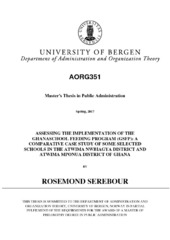| dc.contributor.author | Serebour, Rosemond | |
| dc.date.accessioned | 2018-02-22T13:35:50Z | |
| dc.date.available | 2018-02-22T13:35:50Z | |
| dc.date.issued | 2017 | |
| dc.date.submitted | 2018-01-08T23:00:02Z | |
| dc.identifier.uri | https://hdl.handle.net/1956/17422 | |
| dc.description.abstract | This thesis sought to assess the implementation of the Ghana School Feeding Program (GSFP) in both the Atwima Mponua District (AMD) and Atwima Nwabiagya District of Ghana (AND). Two beneficiary basic schools – Adupri Basic Primary School (ABPS) and Mfensi Methodist Basic Primary School (MMBPS) – respectively located in AMD and AND were purposively selected as objects of study in undertaking this comparative assessment of the feeding program. The study is mainly qualitative in nature and relies on both primary and secondary sources of data. The study further employed both the Winter and Van Horn & Van Meter theoretical models of implementation in its findings and analyses. Findings from the study reveal that the caterers’ model of procurement under the local GSFP is in operation in the two selected schools because it offers stable funding and no disruption in the continuity of the feeding program in the face of undue government delays in the release of feeding funds. Again, the study’s outcomes show that the implementation of the GSFP has increased school enrolment, attendance and retention in the two districts and schools. The study further identified peculiar implementation challenges in both schools. ABPS lacked basic infrastructural development such as a properly-built kitchen and access to potable water to effectively run the GSFP while the feeding program at MMBPS is affected by local politics and a zero or little community involvement. The inability of the Government of Ghana (GoG) to promptly pay the caterers for their services coupled with undue delays in releasing feeding grants was a common problem. Also, the quality and quantity of food provided to pupils at lunch was low. The study recommends that the GoG should minimize its undue delays in releasing feeding grants and endeavour to promptly pay the caterers. Finally, the schools especially ABPS should be assisted with its infrastructural development. | en_US |
| dc.language.iso | eng | eng |
| dc.publisher | The University of Bergen | eng |
| dc.subject | GSFP | eng |
| dc.subject | case study | eng |
| dc.subject | comparative analysis | eng |
| dc.subject | Ghana | eng |
| dc.subject | qualitative research | eng |
| dc.title | Assessing the implementation of the Ghanaschool feeding program (GSFP): A comparative case study of some selected schools in the Atwima Nwbiagya district and Atwima Mponua district of Ghana | eng |
| dc.type | Master thesis | en_US |
| dc.date.updated | 2018-01-08T23:00:02Z | |
| dc.rights.holder | Copyright the author. All rights reserved. | en_US |
| dc.description.degree | Master's Thesis in Public Administration | |
| dc.description.localcode | AORG351 | |
| dc.subject.nus | 731111 | eng |
| fs.subjectcode | AORG351 | |
| fs.unitcode | 15-12-00 | |
